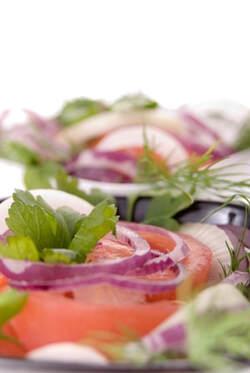|
|
|
28/5/2020 0 Comments 10 Healthy barbecue tips Summer is here and there’s nothing quite like the sizzle of the grill ! Eating healthy certainly doesn’t have to be boring. It’s especially important now more than ever due to Covid-19, to eat quality foods for wellness and avoid ultra-processed foods. People who eat a well-balanced diet tend to be healthier with stronger immune systems and lower risk of chronic illnesses and infectious diseases. Here’s ten delicious and nutritious barbecue ideas to enjoy: 1. Grill up some fish Grilled fish can be a delicious, healthy alternative to red meat on the barbecue. Rich in omega 3 fatty acids, fish has been linked to a number of health benefits, including supporting your heart, brain, immune and mental health. Choose fresh fish like salmon, sea bass, cod and whole perch and enjoy a tasty protein hit. 2. Get creative with salads Fresh, light and full of flavour, salads are the perfect way to balance out your barbecue meal. Serve up green leafy salads with nutritious ingredients like this quinoa superfood mix and add in some grated raw carrot. Other options are chickpea and rice salads or a classic Greek salad topped with feta. 3. Choose healthier cuts of meat You can make a big difference in lowering the fat content of your barbecue by choosing leaner cuts of meat. Choose loin or round cuts of red meat and pork, look for choice or select grades of beef rather than prime, and trim off the excess fat before cooking. Red meats are higher in red iron and zinc which support the immune system. If you’re cooking chicken, a good trick for lightening it up is to remove the skin first – the skin soaks up all the juices and fat while it’s cooking. Choose chicken breasts instead of the fattier dark meat (legs and thighs). 4. Burgers (meat or veggie) If you love burgers, you could go for the pre-made variety or attempt to make your own super healthy versions. The trick is to buy lean minced meat either, beef, chicken or turkey (or lentils, chickpeas or kidney beans for a filling vegetarian option). 5. Skip heavy marinades and condiments Lighten up the salt, sugar and fat content of your barbecue by swapping heavy, preservative-filled marinades with simple ingredients like olive oil and fresh herbs and spices. 6. Corn on the Cob A barbecue isn’t quite a barbecue without corn on the cob with a little quality butter and salt. Say no more. 7. Serve healthier snacks Ditch the bag of potato chips and try raw veggies like carrot, cherry tomatoes, capsicum and celery sticks served with a yummy, nutritious guacamole, yogurt or salsa dip. 8. Infused Colourful Waters Skip the fizzy, sugary soft drinks or beers and drink plenty of water. If you want something a little more exciting, try some unsweetened iced tea, sparkling water or infused colourful waters with slices of lemon, oranges and a few berries. 9. Grilled Halloumi A Cypriot barbecue has got to have some halloumi cheese ! Serve with sliced tomatoes and pita bread. Heavenly ! Halloumi is a great source of calcium, but it is high in fat and salt – so a little slice will do. 10. Barbecued Shrimp Kebabs With Garlic and Herbs Shrimp are the ideal choice for weight loss. They pack a protein punch for very few calories. Four large shrimp (30g) have about 30 calories, 6 grams of protein and minimal fat. Shrimp are a good source of vitamin D, selenium, omega-3’s the antioxidant astaxanthin and even contains several energy-boosting B-Vitamins. If you would like to purchase any products from Foodsaver, here is a link to their online foody store: https://foody.com.cy/en/menu/foodsaver or visit their stores found island wide.
0 Comments
 Did you know that ninety per cent of serotonin is made in the gut ? Serotonin is the happy hormone which helps to stabilize our mood, feelings of well-being, and happiness. This hormone affects your whole body. It enables brain cells and other nervous system cells to communicate with each other. Serotonin also helps with sleeping, eating and digestion. By eating well and feeding the healthy bacteria in your gut, the body's ability to generate serotonin is significantly increased, helping you feel more relaxed, happy, and confident. The digestive system is now seen as fundamental to our overall health in most traditional medicine systems. Digestion has a strong influence on our nervous, hormonal and immune systems. The role of foods is now increasingly recognised in conditions not previously associated with diet: auto-immune disorders like rheumatoid arthritis or multiple sclerosis; mood and behaviour problems such as autism, ADHD and depression; degenerative disorders such as Alzheimers's and arthritis; allergic conditions including asthma and eczema. Inflammation underlies these and most chronic disease like obesity, heart disease and cancer. We can modify these destructive inflammatory responses by the kinds of food we eat and how we eat them. Common problems like heartburn, indigestion and constipation can be managed with understanding how to use foods, herbs and spices in self-care. There are obviously other factors that affect our digestive health, such as our stress load: sleep, diet, alcohol, smoking, weight, liver function, circulation, mood, exercise, chemicals, food quality etc, but you can begin to support your digestive health by understanding the basic digestive functions and being mindful of your body. Here are some common digestive herbs, along with their health benefits which you should experiment with in your cooking, or drink them as herbal teas: 1. Ginger: Ginger is warming and calming to the digestion, anti-nausea and anti-microbial to many common stomach bugs. Warms cold hands and feet. 2. Turmeric: Turmeric is carminative - meaning it can relieve bloating, liver supporting, an anti-microbial and a powerful anti-inflammatory. 3. Fennel: Fennel can also help relieve bloating and is stimulating to the liver. It improves appetite, increases milk production and eases colic. It expels upper respiratory catarrh, is an eyewash for conjunctivitis and has a balancing estrogenic action. 4. Caraway: Caraway is a supreme herb for the digestive system, eases stomach cramps and nausea, helps expel gas from the bowel and prevent fermentation in the stomach. 5. Cinnamon: Cinnamon is a warming stimulant to appetite and circulation. Antiviral, antibacterial and anti-fungal. Helps reduce blood sugar and ulcer causing Helicobacter pylori. 6. Garlic: Garlic is anti-microbial, and probiotic due to its inulin and other compounds, which supports cardio-vascular health. Onion, shallot and leek belong to the same Allium genus family and have similar actions. 7. Rosemary: Rosemary is a stimulating carminative that helps to clear your liver and head. 8. Peppermint: Peppermint is refreshing as well as antispasmodic, cooling and anti-microbial. It's useful in coughs and colds, supports liver function and helps stop itching when used topically. 9. Dill: Dill is calming and can be used as a sedative. It's useful to promote restful sleep, dispel colic and cramping pain. It's a key ingredient in gripe water. 10. Allspice: Allspice is warming and settling to the gut. The eugenol content promotes digestive enzymes, is analgesic and antiseptic. Most beneficial when drank as a tea after a meal. 11. Tulsi (Holy Basil). Is a herbal plant traditionally used in Ayurvedic medicine to reduce fever, strengthen the immune system, calm nerves, and act as an anti-inflammatory and antioxidant. Studies have shown that Tulsi (Holy Basil) can lower cortisol the stress hormone and blood sugar levels to help our bodies cope with stress. Research has also shown that ursolic acid and triterpenoic acids both of which are found in Holy basil effectively improve the body’s response to stress and reduce the amount of cortisol released during stress. It’s no coincidence that Tulsi has been nicknamed “nature’s stress reliever” 11/5/2020 0 Comments It's Time to return to Our Greek - Cypriot mediterranean roots in the age of covid-19 Modern living in large cities have had a negative impact on our physical and mental health. Stress and modern living for most people go hand in hand and has been scientifically linked with various diseases but also with bad life decisions such as bad nutrition, smoking, excessive alcohol consumption, lack of sleep and stressful relationships. For mental health, research has proved that exercise, praying and meditation can help us better control our lives, focus, and solve our problems. They also contribute to our feeling blessed with what we have, which reduces anxiety. Gratitude is a wonderful trait to develop. A well know exercise to remind ourselves of all the things that we can be grateful of, is to have a gratitude notebook or diary. Once a day write down three things you are grateful for. It could be as simple as the running hot water you have in your house or the beautiful smile your child gave you. It’s a great exercise to remind ourselves of how many good things we can be grateful for in our daily lives. It is relevant now more than ever our greeting and toast ‘stin ygeia mas’ – to good health, as we wish our fellow human beings to be strong and healthy and full of life ! All over Cyprus and Greece, there are a great variety of cuisines, practices, and recipes, often connected with Christianity and fasting (called ‘nistia’ which I see as a great opportunity to detoxify the body) and connected with meditation, praying, good deeds, and positive thoughts about our fellow humans. But the context is always the widespread Mediterranean diet – with local variations based on the available seasonal ingredients and location. Ancient traditions also connect food with the environment. The rocky hills of Cyprus, Epirus and Crete are better for goats and sheep, where people made cheese from their milk. And in Macedonia’s rich valleys near Lake Kerkini, water buffalo have survived and give us their delicious products. The same applies to plants – we have a large variety of wild and domesticated edible plants rich in nutrients that we can add into our diets including fruits like figs, oranges, lemons and pomegranates grown in coastal regions right up into mountainous areas where apples, pears, cherries, apricots and so many other fruits are found. There is a consensus on what constitutes the Mediterranean diet, which nutritionists believe is best reflected in traditional Greek food: Meals are rich in fruits and vegetables and sprinkled with many different herbs and spices which add to the antioxidant content of the food. The key to long term health is to create healthy eating and healthy lifestyle habits and attitudes for life ! The Greek Mediterranean Diet incorporates the basics of healthy eating and living. In the Mediterranean diet pyramid, every meal is ideally based on fruits, vegetables and mostly whole grains. These form the base of the pyramid, along with olive oil, beans, nuts, legumes, seeds, herbs and spices. Next are fish and seafood, which should be eaten often – at least twice a week. Poultry, cheese, eggs and goat’s yogurt follow next; moderate portions of each are acceptable daily or weekly. At the very top of the pyramid are meats and sweets; these foods should be enjoyed less often, only on occasion. In times of Covid-19 – avoid sweets made with sugar and use raw unprocessed honey, carob or grape syrup in small amounts. Sugar has been known to depress the immune system. Mediterranean cuisine is naturally vegetarian-friendly and appeals to all ages and nationalities. The sheer variety of ingredients create dishes that are both comforting and yet have rich, complex flavours. The most important component of the Mediterranean diet might very well be social, with an emphasis on enjoying meals together with family and friends… make a point of sitting down as a family to eat or prepare meals together whenever possible and hopefully in the near future we will be eating with friends too. In people found in well know Ikaria, Okinawa and Sardinia we can see that they are connected in common nutritional principles of eating a mostly unprocessed plant based diet which is the key to longevity and to keeping your immune system working healthily and in addition they all live a lifestyle free from stress, live closer to nature and have naps ! Enjoy the videos. Ikaria nutrition and Ikaria Siesta. |
AuthorBarbara is a qualified nutritionist offering Health, Nutrition & Lifestyle Counseling. She gives Healthy weight loss advice and promotes the Mediterranean diet. She is the author of the Med Life Diet - creating healthy lifestyle habits and attitudes for life ! Archives
April 2024
|
 RSS Feed
RSS Feed
